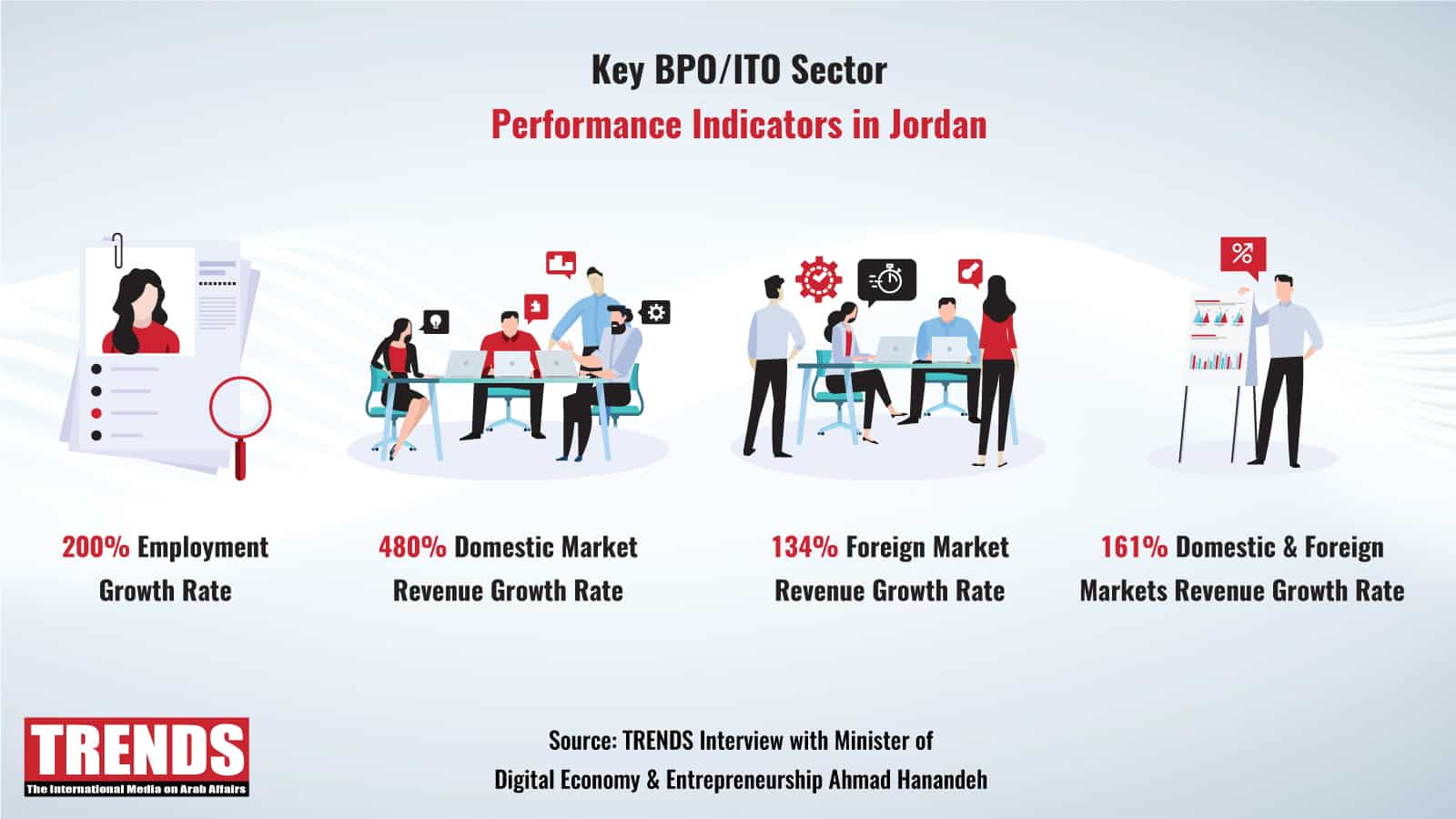MENA-region countries are developing rapidly in the ICT sector, aiming to increase investments and be a part of the technology revolution.
Among them, Jordan has launched the Source Program to achieve its goals in the sector.
TRENDS interviewed Minister of Digital Economy and Entrepreneurship Ahmad Hanandeh for more details about the government’s goals and the investors’ opportunities in the kingdom.
Supportive government, robust infrastructure

Hanandeh explained to TRENDS that the launching webinar of the initiative promoted Jordan “as a BPO/ITO destination by highlighting the Jordan advantage that includes its qualified abundant talent, strategic location, supportive government, and robust infrastructure.”
The webinar also highlighted how tech giants such as Amazon and leading BPO/ITO companies could grow in Jordan by leveraging its enabling environment: the talent, government, and infrastructure.
The program targets international BPO/ITO firms interested in establishing operations in Jordan and/or outsourcing some of their services to BPOs or ITOs currently operating in the country.
In addition, through the Jordan Source Program, the government aims to increase investments in the ICT sector, create jobs for the Jordanian youth, and encourage the overall growth of the digital economy.
Investment opportunities
Investment opportunities in the Jordanian ICT sector are many and include outsourcing, such as Business Process Outsourcing (BPO), Knowledge Process Outsourcing (KPO), and customer call centers.
Hanandeh also said Jordan’s skilled workforce enables international firms to undertake back-office business and IT services and exports using Jordan’s BPO services park.
Investment opportunities also exist in IT solutions for Jordan’s financial sector and enterprise solutions and emerging applications.
In addition, Jordan is experiencing an influx of investment to develop software-dependent sectors such as transportation, tourism, energy, and water.
With these developments, Hanandeh hopes the project will increase the need for reliable information technology software.
As for the overall industry:
- Jordan’s ICT sector generates 75 percent of Arabic internet content.
- Jordan offers a competitive proposition for investment in content applications and e-learning with regionally competitively priced broadband internet tariffs at $42.7 per month at purchasing power parity (PPP) prices
ICT sector features in Jordan
Hanandeh mentioned several features for the ICT sectors in Jordan that might attract investors. These include:
-
- Abundant Talent
– Nationwide Arabic and English bilingual proficiency.
– Local dialect like Fusha — proper written Arabic — and well-understood by all Arab nations.
– A young population, where 5.5 million are under 24 years old.
– 81 percent of universities offer IT-related programs.
– Over 60,000 university graduates per year, with over 8,000 majoring in ICT. - A supportive government
– Seven free trade agreements, including the United States granting access to 1.5 billion customers in 161 countries.
– 55 bilateral investment treaties.
– 27 double-taxation agreements.
– No income tax on ICT revenues from exports.
– No sales tax on ICT production input and sales activities in Jordan.
– No customs fee on ICT production input.
– Just 5 percent income tax on profits generated in Jordan.
– Just 5 percent interest-rate ceiling for IT-related soft loans.
– New Secured Lending Law, allowing moveable assets such as intellectual property to be used as collateral.
– Government-funded salary subsidy opportunities for digital and/or digitally-enabled firms.
– Government-funded market expansion grants for digital and/or digitally-enabled firms.
– Government-funded upskilling programs on digital skills.
- Abundant Talent
Robust Infrastructure: internet and mobile connectivity:
-
-
- – Multiple full-ring fiber networks.
-
- – 99 percent 4G, fiber, and broadband internet coverage, with 5G coming soon
-
- – International and regional connectivity through multiple land and submarine cables through Egypt, Saudi Arabia, Palestine, and Google’s Blue-Raman submarine cable between India-Italy passing through Aqaba.
-
- – 99.5 percent mobile coverage.
-
Essential developments needed
Jordan is also strategically located in the heart of the Middle East with easy access across the region; it is also politically and economically safe and stable.
However, the kingdom needs several developments, as Hanandeh told TRENDS.
These include streamlining the investors’ journey by creating a task force including all relevant parties, and a PR & Communications plan that would involve positioning Jordan as a global BPO/ITO hub.
In the end, Jordan aims to create an integrated system of work to ensure the implementation of the strategic objectives of digital transformation by providing the infrastructure necessary for the process of digital transformation with the latest and best technologies.
Hanandeh also said: “Technology and jobs project with a sub-component dedicated to revamping the IT curriculum taught in public schools from grades 7-12 will include all the 21st-century digital skills. Meanwhile, the upskilling grants (up to $150,000) provided to training-service providers will equip youth on the latest in-demand digital skills.”
World Bank Support
Jordan’s Ministry of Digital Economy and Entrepreneurship (MoDEE) launched the Jordan Source Program to increase regional and international investments in the kingdom’s digital outsourcing economy.
The MoDEE conducted a webinar titled “Jordan’s Qualified IT Talents: Your Winning Card Against Your Competitors” in partnership with the World Bank Group.
“Jordan’s most incredible resource has always been its youth talent,” said Ferid Belhaj, MENA Vice-President for the World Bank, which has been supporting the ICT initiative from the start.
He added: “More than 50 percent are under the age of 24, with 22 percent holding degrees in IT, computer science, and engineering.”
The World Bank estimates Jordan’s real GDP will grow 1.9 percent in 2021, as economic indicators suggest an upswing in private demand while global demand remains supportive.
Tech entrepreneurs from Jordan
Crown Prince Al Hussein Bin Abdullah II kicked off the Jordan’s Qualified IT Talents: Your Winning Card Against Your Competitors webinar by highlighting the strength and potential of the kingdom’s ICT sector.
He said 27 percent of the Middle East and North Africa (MENA) tech entrepreneurs are Jordanian, even though Jordan accounts for just 3 percent of the region’s population.
Regarding the ICT sector, Abdullah said: “Our ICT sector boasts more than 600 technology companies and startups, while our tech talents have had an outstanding impact extending far beyond Jordan’s borders.”









